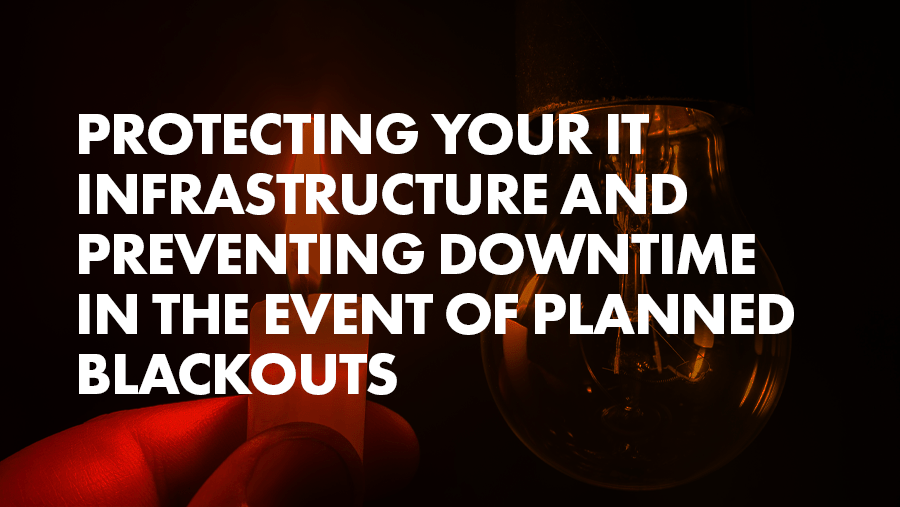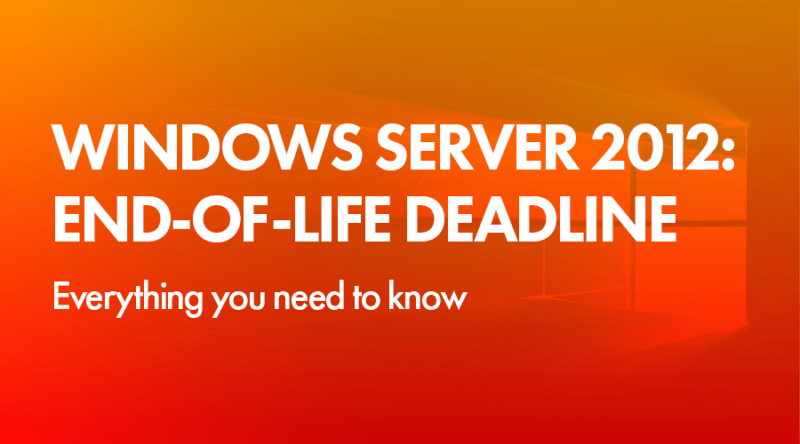In light of the news circulating about the possibility of planned blackouts during the winter months, it’s important that businesses understand the issues that may arise ahead of this potential energy emergency and to have a contingency plan in place.

In this article, we explain what the planned blackouts could mean for businesses across the country, how it could affect day-to-day operations and the steps you can take to protect your IT infrastructure.
What’s in the news?
The National Grid has raised the possibility of the need for planned national blackouts, or planned power outages/power cuts, in order to manage the possibility of energy demand exceeding the supply available in the face of cold weather.
Although deemed ‘unlikely’ the National Grid has proposed these emergency procedures in the event of gas imports being reduced. The planned blackout will mean that households and businesses in certain parts of the country could see their power cut off, both gas and electricity.
Should planned blackouts be imposed, these are rumoured to be on a rotation basis, so that not all parts of the country would be affected at the same time, or on the same day. The outages would most likely be three hours per day, around 4pm-7pm on weekdays, during the colder days in January and February.
What could this mean for businesses?
It has been stated that businesses that meet a certain criteria will be protected from outages, these will typically be businesses that are deemed to be critical national infrastructure, such as air traffic control centres, hospitals with A&E departments, critical transport or telecommunications.
Under the Electricity Supply Emergency Code (ESEC) businesses can apply for site protection, as it is not automatic. This could mean that your business will continue to receive power during the planned blackouts. However, your business site or office may not be impacted, but your home working employees would be, as households won’t be protected.
Information on ‘Protected sites’ can be found in the government’s Electricity Supply Emergency Code.
Your business might therefore need to consider preparing for shorter working hours or the return to office-based working. This may mean you will need to consider introducing a plan for more desk space, devices and increased power supply.
As experienced during the Covid-19 pandemic, technology and equipment became hard to get hold of, and rose considerably in cost, so it is advisable to take action as soon as possible if your business is likely to need to prepare for this instance.
Power outages are also harmful to your IT infrastructure because an outage can result in lost data, corrupted files and damaged equipment.
Things to consider
At Air IT, we are looking into contingencies that will help keep our company operational, whilst preventing damage and loss of key IT infrastructure, should planned blackouts be imposed. We have put together a few steps that we are considering, and we encourage businesses to do the same to help avoid a total disruption to their business and IT operations, in the event of power outages.
1. Protecting key infrastructure with UPS’s
What is a UPS?
A UPS is an uninterruptible power supply that provides emergency power to a load when the input power source fails.
By plugging your key infrastructure, such as a server, switches and PCs into a UPS, you can ensure that if power is lost at any point, the server recognises the drop in power and shuts down safely. This reduces the risk of damage to the server and loss of critical business data.
As mentioned, we may expect longer lead times on technology, and increased costs, so if your business doesn’t have a UPS currently in place, we highly recommend that you act as soon as possible.
2. Data and backups
The UK government has held discussions with some of the biggest cloud data centre operators about ways to keep businesses data safe during any potential power blackouts in the winter months. Suppliers are said to be using diesel powered generators as a contingency in order to stay up and running. The government is also considering classifying data centres as essential national infrastructure, if confirmed this will mean that they will not be affected by the power outages.
If your business is operating on a local on-site server and you are concerned that this is a risk, migrating to the cloud could be a consideration.
Additional factors to think about when it comes to reducing risk of data loss is checking that backups are functioning correctly, ensuring all data sources are backed up (e.g. Microsoft 365 data), storing data and documents on a shared network and also considering increasing the frequency of backups.
3. Hosted Voice / VoIP and Wi-Fi hotspots
What is VoIP?
Voice over Internet Protocol (VoIP), is a technology that allows you to make voice calls using an internet connection, instead of a regular phone line.
Most modern VoIP systems integrate with mobile devices (mobile phones, laptops, tablets), which will be advantageous in the event of power outages. VoIP requires Wi-Fi access, meaning typical access via broadband lines wouldn’t be an option during a blackout. One way to avoid Wi-Fi disruption would be through mobile phone networks or portable sim card routers, connecting core devices via a Wi-Fi Hotspot (assuming mobile networks aren’t affected).
4. Keeping devices fully charged
Planned blackouts are likely to be 3 hours per day, around 4-7pm. To avoid downtime during this time we suggest setting recurring reminders to encourage employees to fully charge all required devices and equipment prior to the planned blackouts, such as laptops and mobile phones. We would also advise running a ‘power health check’ on all devices to ensure that they can run optimally without being connected to a power outlet.
Purchasing additional power supplies such as batteries and power banks to keep devices up and running is another sensible investment.
5. Off-grid power options
If your business does not meet the criteria for Government site protection, off-grid power generators such as solar power may need to be considered if your business must continue to operate during outages.
Although a potential consideration in response to the much-speculated planned blackouts; with net zero targets looming and energy prices at record highs, now might be the time to think about running off-grid.
Protect your business today
We will continue to monitor the advice and guidance surrounding the news of planned blackouts. If you’re concerned about your IT infrastructure and would like to find out more about protecting your business data and technology, please get in touch.
Last updated 17/11/2022 12:26




